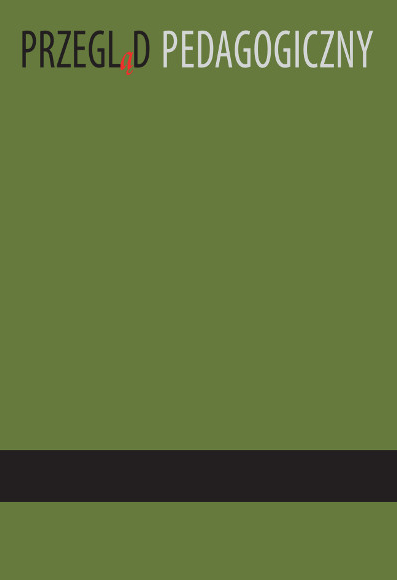Dydaktyka i polityka w filozofii wychowania Paula Freirego: O porzuceniu pojęcia konscientyzacji
DOI:
https://doi.org/10.34767/PP.2019.01.03Słowa kluczowe:
pedagogika, konscientyzacja, edukacja ludowa, Freire, Afryka Luzofońska, pedagogika rzeczyAbstrakt
Zasadniczym celem tego artykułu jest zaprezentowanie afrykańskich doświadczeń Freirego, doświadczeń, które przekształciły tak jego metodę kształcenia, jak filozofię wychowania. Jego udział w saotomejskiej akcji alfabetyzacyjnej zaowocował porzuceniem kategorii konscietyzacji, która dotychczas była centralnym pojęciem jego filzofii.Taka postawa Freirego wzięła się z tego, że nauczyciele interpretowali konscientyzację, zakładając swoją wyższość względem osób uczących się. W trakcie saotomejskiej akcji alfabetyzacyjnej Freire doszedł do wniosku, że społeczna symetria w edukacji (podobnie jak w ogóle w społeczeństwie) bierze się ze skupienia się procesów komunikacji na praktycznych problemach wspólnoty, które są na równi trudne do rozwiązania dla nauczycieli, jak i ucznów. Wobec czego, pedagogika rzeczy (Hodgson et al., 2017; Biesta, 2010; Latour, 2007) – którą można postrzegać jako nowy paradygmat w teorii edukacji – może być wywiedziona z filozofii Freirego.
Bibliografia
Biesta G. (2010). A new logic of emancipation: The methodology of Jaques Rancière. Educational Theory, 60(1), 39-59.
Caldeira A.M. (1999). Mulheres, sexualidade e casamento em São Tomé e Príncipe (séculos XV–XVIII). Lisbon: Cosmos.
Ellsworth E. (1989). Why Doesn’t This Feel Empowering? Working Through the Repressive Myths of Critical Pedagogy. Harvard Educational Review, 59(3), 297-324.
Escobar M., Fernández A.L., Guevara-Niebla G., Freire P. (1994). Paulo Freire on Higher Education. A Dialogue at the National University of Mexico. New York: State University.
Faundez A. (1996). Paulo Freire e o Conselho Mundial das Igrejas. In: M. Gadotti (ed.), Paulo Freire. Uma biobibliografia (p. 190-191). São Paulo: Cortez/IPF.
Freire P. (1978a). Cartas à Guiné-Bissau. Registros de uma experiência em processo. Rio de Janeiro: Paz eTerra.
Freire P. (1978b). Cartas aos Animadores e às Animadoras Culturais. São Tomé: Ministério de Educação Nacional e Desporto.
Freire P. (1979). Conscientização. Teoria e prática da libertação: uma introdução ao pensamento de Paulo Freire. São Paulo: Cortez&Moares. Downloaded on 1 September 2017.
Freire P. (1989). A importáncia do ato de ler. São Paulo: Cortez. Downloaded on 1 September 2017.
Freire P. (2016). Pedagogy in Process. The Letters to Guinea-Bissau. London–New York: Bloomsbury.
Freire P., Faundez A. (1989). Learning to Questions. A Pedagogy of Liberation. New York: Continuum.
Freire P., Faundez A. (1998). Por uma pedagogia da pergunta. Rio de Janeiro: Paz e Terra. Downloaded on 1 October 2017.
Freire P., Macedo D. (2005). Literacy. Reading the Word and the World. London: Routledge.
Gadotti M. (1996). Escritos de Paulo Freire. In: M. Gadotti (ed.), Paulo Freire. Uma biobibliografia (p. 255-323). São Paulo: Cortez/IPF.
Gerhardt H.P. (1996). Arqueologia de um Pensamento. In: M. Gadotti (ed.), Paulo Freire. Uma biobibliografia (p. 149-170). São Paulo: Cortez/IPF.
Gibson R. (1996). Promethean Education: Liberation or Chained to the Same Old Rock? Paulo Freire and the Contradictions of Literate Democracy. Downloaded on 15 August 2019.
Gibson R. (2008). The Dead End in Freire. Speech at Canadian Society for the Study of Education, University of British Columbia, Vancouver BC. Downloaded on 15 August 2019.
Giroux H.A. (2001). Theory and Resistance in Education. Towards a Pedagogy for the Opposition. Westport–London: Bergin&Garvey.
Harasim L. (1983). Literacy and National Reconstruction in Guinea Bissau: A Critique of the Freirean Literacy Campaign. Toronto: University of Toronto. Hodgson N., Vlieghe N., Zamojski P. (2017). Manifesto for a Post-Critical Pedagogy. Earth: punctum books.
Latour B. (2007). Reassembling the Social. An Introduction to Actor-Network-Theory. Oxford: Oxford University Press.
Mafra J.F. (2010). O ser humano integral e o humanismo científico de Suchodolski. In: I. Wojnar, J. Mafra (ed.), Bogdan Suchodolski (p. 37-49). Recife: FJN/Massangana.
Malott C.S. (2017). In Defense of Communism. Against Critical Pedagogy, Capitalism and Trump. Critical Education, 8(1), 1-25.
McLaren P. (2000). Che Guevara, Paulo Freire and the Pedagogy of Revolution. Lanham: Rowman&Littlefield.
Pape D., Rebelo de Andrade R. (2013). As Roças de São Tomé e Príncipe. Lisbon: tinta-da-china.
Pereira P. (1989). Experiência de Educação de Adultos na Guiné-Bissau. Bissau: Departamento de Educação de Adultos.
Piłaszewicz S., Rzewuski E. (2005). Wstęp do afrykanistyki. [Introduction to African Studies]. Warsaw: Uniwersytet Warszawski.
Rancière J. (1991). The Ignorant Schoolmaster. Five Lessons in Intellectual Emancipation. Stanford: SUP.
Romão J.E., Gadotti M. (2012). Paulo Freire e Amílcar Cabral. A descolonização das mentes. São Paulo: IPF.
Scocuglia A.C. (2005). Paulo Freire e a ‘conscientização’ pós-moderna. Educação, Sociedade e Culturas, 23, 21-42.
Siebert G. (1999). Comrades, Clients and Cousins. Colonialism, Socialism and Democratization in São Tomé and Prícnipe. Leiden: Brill.
Silva T.T. (2005). Pedagogia do oprimido versus pedagogia dos conteudoúdos. Educação, Sociedade eCulturas, 23, 207-214.
Szkudlarek T. (2016). On the Politics of Educational Theory. New York–London: Routledge.
Torres C.A. (1993). From the Pedagogy of the Oppressed to A Luta Continua: The Political Pedagogy of Paulo Freire. In: P. McLaren, P. Leonard (eds.), Paulo Freire: A critical encounter (p. 119-145). London–New York: Routledge.
Torres C.A. (1996). Uma biografia intelectual. In: M. Gadotti (ed.), Paulo Freire. Uma biobibliografia (p. 117-148). São Paulo: Cortez/IPF.

